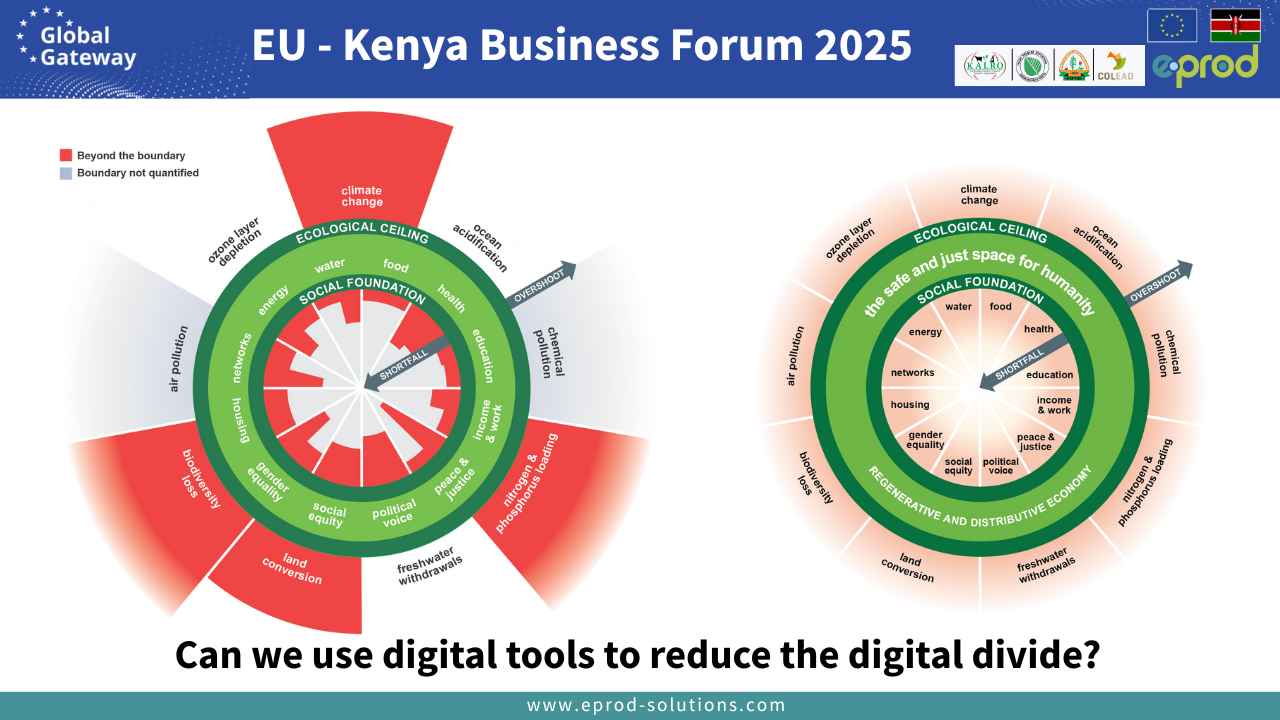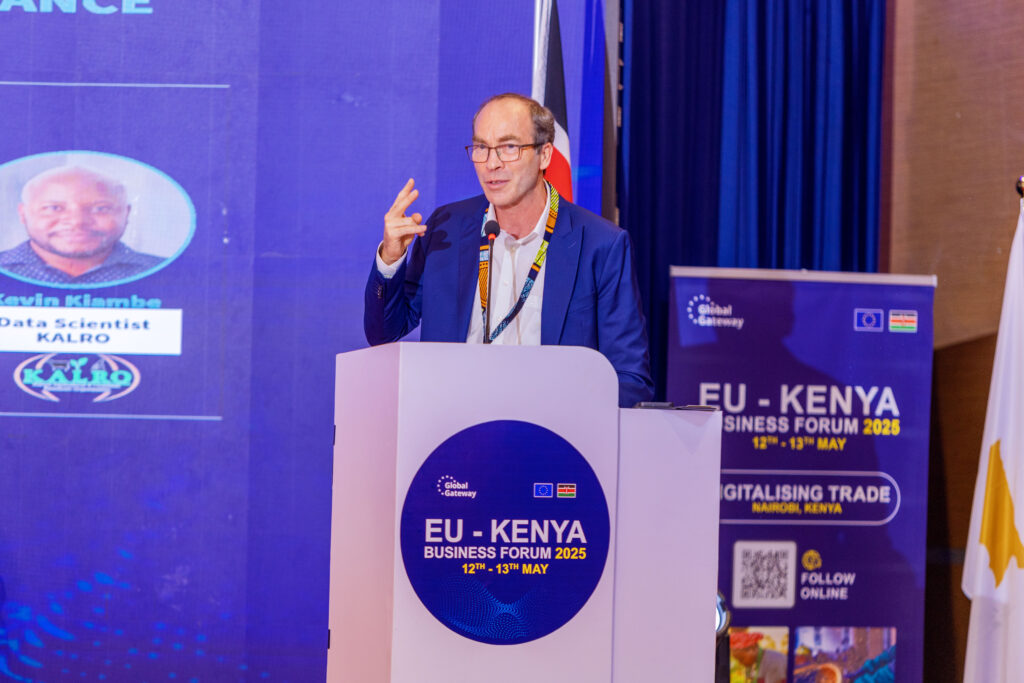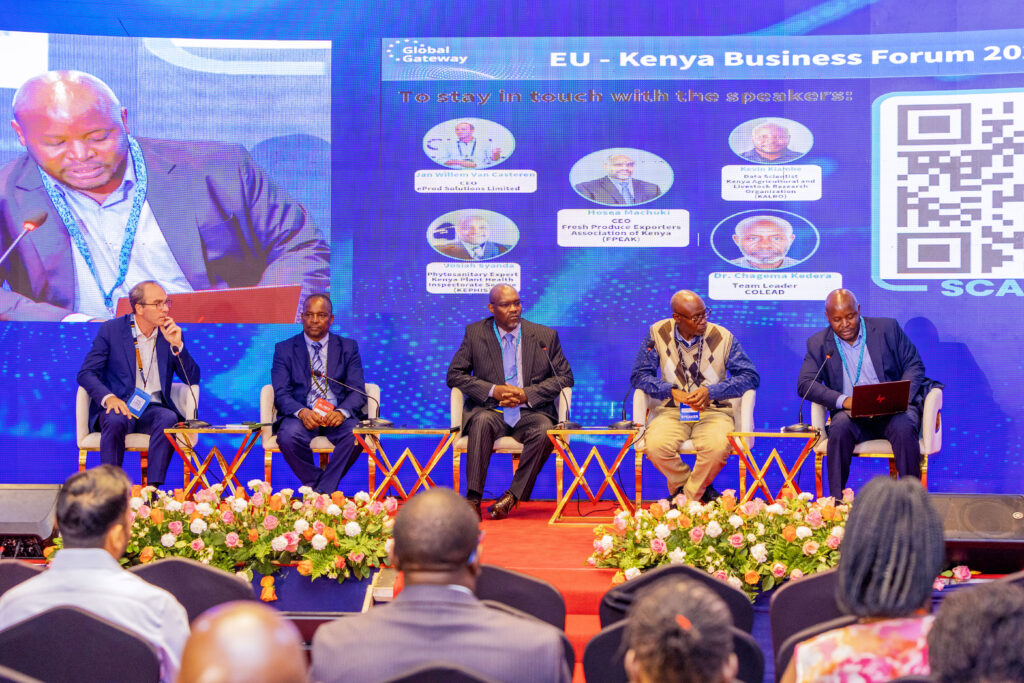
EU Kenya Business Forum 2025 Hosted Roundtable on Digital Solutions for Export Standards Compliance: “Can a 6th Agricultural Revolution resolve the digital divide on SPS compliance?”
On May 12th and 13th, 2025, Nairobi, Kenya, as part of the EU – Kenya Business Forum 2025, a Roundtable discussion on leveraging technology to meet export standards compliance was held. Compliance with Sanitary and Phytosanitary measures and standards can be challenging for Kenyan exporters, leading to frequent interceptions and rejections of products like flowers, avocados, and capsicum due to issues such as pesticide residues and pest infestations. Adhering to these standards is crucial for maintaining market access and competitiveness in the EU market. Sourcing from smallholders creates additional challenges. Digitalization plays an important role to meet the standards, however, it can also lead to exclusion of farmers.
As described in Doughnut Economics: Seven Ways to Think Like a 21st-Century Economist, there is only a narrow operational bandwidth within the ecological ceiling, what can be produced environmentally sustainably, and the social foundation, what has the least negative social impact or creates benefits. Within this bandwidth, how do we avoid social shortfalls and ecological overshoots, while Kenya continues building an agricultural export market to the EU? Can social shortfalls be reduced by the use of technologies such as AI and Blockchain.

According to Jan Willem Van Casteren, the Roundtable facilitator and CEO of eProd Solutions: “Digital solutions, such as AI, Blockchain, IOT, autonomous vehicles, vertical farming, et cetera should be used to serve both ecological and inclusivity goals simultaneously. The new technologies should be used to initiate an agricultural revolution that reduces the digital divide and at the same time creates market opportunities for smallholders while ensuring that SPS standards are not compromised”.
Digital tools have been introduced relatively recently. Before diving into how digitalization can assist, it is important to understand the time it took for major historical technological innovations before they had a revolutionizing global impact on agriculture.
Even though farming started roughly 10,000 years ago, productivity did not significantly improve until the Second Agricultural Revolution from the 1700s to early 1900s. The advance of the Industrial Revolution brought new technologies such as the seed drill, steam engine, mechanization, and industrial fertilizer chemical urea. This increase in productivity provided cheaper food, which allowed population growth and urbanization. Many less developed countries are still at this stage, however.
From the 1930s, the invention of hybrid crops and improved breeding systems resulted in a global rise in food production and from the 1950s became known as the Green Revolution. Intensive use of chemicals was required to realize this Third Agricultural Revolution, resulting for the first time in history in serious food safety and environmental and social exclusion risks.
Even though computers were introduced earlier, the Fourth Agricultural Revolution began only recently in 2011 with the use of deep computerization, introduction of IoT, and cybernetics. This new revolution is often termed Precision Agriculture, Digital Farming, or Smart Farming, which is starting to disrupt and transform current agricultural systems.
Currently, we have already reached a Fifth Agricultural Revolution, characterized by the introduction of Blockchain, AI, driverless vehicles, vertical farming, harvesting robots, and autonomous systems in industrial farming. However, many countries are still at the Second Agricultural Revolution and facing a digital divide. How does this impact the relatively small-scale farming systems in Kenya? Can new technologies trigger a 6th Agricultural Revolution serve both ecological as well as social goals?
The panel included top experts from both private and public sectors and discussed key challenges and solutions to convert SPS measures into opportunities for Kenyan farmers, particularly smallholders. Speakers included (second from left on below picture) Josiah Syanda, SPS compliance specialist and #KEPHIS director, Hosea Machuki, CEO of #FPEAK (middle); Dr. Chagema, Programme Coordinator Under COLEAD (second from right), and Kevin Kiambe, IT specialist at KALRO working #DigitalPublicInfrastructure (right).

The session brought together an audience of policy makers, industry leaders, and innovators to explore how integrated supply chain management IT platforms can enable small and medium-sized enterprises (#SMEs) to meet sanitary and phytosanitary (#SPS) standards, as well as environmental, social, and governance (#ESG) standards required for agro-exports under the EU-Kenya Economic Partnership Agreement (#EPA).
Key Discussions
The discussion highlighted several critical points:
- Challenges in Exporting to the EU: Kenyan exporters face significant hurdles in meeting the EU’s General Food Law Regulation, which mandates traceability through all stages of production, processing, and distribution. The introduction of new directives like the EU Deforestation-free Regulation (#EUDR) and Corporate Social Responsibility Directive (#CSRD) has added to the complexity, creating market uncertainty and increasing the risk of exclusion for smallholders.
- Need for Digital Platforms: To address these challenges, the roundtable emphasized the need for cost-effective and appropriate digital platforms. These platforms should provide holistic management solutions for farmer-based organizations, agricultural commodity traders, and food processors. They must also ensure compliance with EU GDPR requirements, manage producers’ privacy, and facilitate access to affordable services, finance, and advisory services.
- Interoperable Solutions: The experts discussed the importance of interoperable platforms that can connect multiple stakeholders, including agro-input dealers, financial institutions, extension services, and weather advisory services. Such platforms should also support geo-spatial mapping, information gathering for due diligence, and advanced information sharing capabilities to meet EU standards.
- Economic Partnership Agreement (EPA): The EPA between Kenya and the EU was highlighted as a significant trade deal aimed at enhancing economic cooperation and development. The agreement provides duty-free and quota-free access to the EU market for all Kenyan exports and includes binding provisions on trade and sustainable development.
Conclusions
The roundtable discussion underscored the critical role of interoperable digital solutions in enabling Kenyan exporters to meet EU standards and gain market access. By leveraging technology, SMEs can navigate the complex regulatory environment, reduce costs, and build long-term relationships with EU companies. The digital innovations, in combination with strict SPS requirements, specifically for the premium EU markets, create a risk of exclusion of smallholders. The latest innovations, such as AI, Blockchain, can also be used to create opportunities and reduce compliance challenges for smallholders, for example by providing localized and tailored advisory services, smart contracts, etc. The event marked a significant step towards promoting sustainable development and economic growth through digital innovation, including smallholders.
Join the Conversation
Stay tuned for more updates on digitalizing trade and how technology is transforming the export landscape. Follow us on social media and join the conversation and reach out to info@eprod-solutions.com
